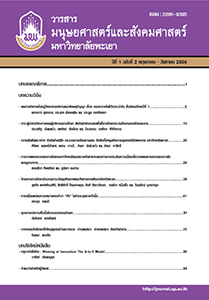ผลการจัดการเรียนรู้วิทยาศาสตร์ตามแนวคิดพหุปัญญา เรื่อง บรรยากาศในชีวิตประจำวัน ชั้นมัธยมศึกษาปีที่ 1
Keywords:
ความมุ่งมั่นในการทำงาน, พหุปัญญา, Working Commitment, Multiple IntelligenceAbstract
การวิจัยครั้งนี้มีความมุ่งหมายเพื่อ 1) เปรียบเทียบผลสัมฤทธิ์ทางการเรียนของนักเรียนชั้นมัธยมศึกษาปีที่ 1 ที่ได้รับการเรียนรู้ตามแนวคิดพหุปัญญา ระหว่างก่อนเรียนและหลังเรียน 2) ศึกษาพัฒนาการด้านพหุปัญญาของนักเรียนชั้นมัธยมศึกษาปีที่ 1 ที่ได้รับการเรียนรู้ตามแนวคิดพหุปัญญาและ 3) ศึกษาความมุ่งมั่นในการทำงานของนักเรียนชั้นมัธยมศึกษาปีที่ 1 ที่ได้รับการเรียนรู้ตามแนวคิดพหุปัญญา กลุ่มตัวอย่างที่ใช้ในการศึกษาในครั้งนี้เป็นนักเรียนชั้นมัธยมศึกษา ปีที่ 1 โรงเรียนนาจานศึกษา อําเภอสีชมพู จังหวัดขอนแก่น ภาคเรียนที่ 2 ปีการศึกษา 2554 จำนวน 41 คน โดยการสุ่มแบบแบ่งกลุ่ม (Cluster Random Sampling) เครื่องมือที่ใช้ในการวิจัย ได้แก่ 1) แผนการจัดการเรียนรู้ตามแนวคิดพหุปัญญา 6 แผน 2) แบบทดสอบวัดผลสัมฤทธิ์ทางการเรียนวิชาวิทยาศาสตร์ จำนวน 30 ข้อ มีค่าอํานาจจําแนกรายข้อ ระหว่าง 0.22 ถึง 0.82 ความเชื่อมั่นของแบบทดสอบทั้งฉบับเท่ากับ 0.82 3) แบบวัดพัฒนาการด้านพหุปัญญา จำนวน 8 ด้าน เป็นแบบมาตราส่วนประมาณค่า (Rating scale) 5 ระดับ พบว่าระดับความเหมาะสมมีค่าเฉลี่ยเท่ากับ 4.74 4) แบบวัดความมุ่งมั่นในการทำงาน จำนวน 20 ข้อ เป็นแบบมาตรส่วนประมาณค่า (Rating scale) 5 ระดับ มีค่าอํานาจจําแนกรายข้อตั้งแต่ 0.36 - 0.78 ค่าความเชื่อมั่นทั้งฉบับเท่ากับ 0.91 สถิติที่ใช้ในการวิเคราะห์ข้อมูล ได้แก่ ค่าเฉลี่ย ส่วนเบี่ยงเบนมาตรฐาน ร้อยละ และทดสอบสมมติฐานใช้ t – test (Dependent Samples)
ผลการวิจัย พบว่านักเรียนที่ได้รับการจัดการเรียนรู้ตามแนวคิดพหุปัญญา มีผลสัมฤทธิ์ทางการเรียนหลังเรียนสูงขึ้น พัฒนาการพหุปัญญาสูงขึ้น และนักเรียนมีความมุ่งมั่นในการทำงานอยู่ในระดับมากที่สุด
Multiple Intelligence in Science Teaching Focusing on Daily Atmospheric for Matthayomsueksa 1 Students
Netdown Mungmai1, Prasart Nuangchalerm2 and Prayoon Wongchantra3
1 Faculty of Education, Mahasarakham University
2 Faculty of Education, Mahasarakham University
3 Faculty of Environment and Resource Studies, Mahasarakham University
The purposes of this study were: 1) to compare learning achievement of Matthayomsuksa in a secondary school 1 students who learned through multiple intelligence approach pre & post method, 2) to multiple intelligence in terms of development in which they had learned, and 3). to study the working commitment of Matthayomsuksa 1 students who learned through multiple intelligence apprpach. The samples were 41 students from Matthayomsueksa 1 students, Najansuksa school, Amphoe Sichompoo, Khonkaen province. Research tools were 6 lesson plans, achievement test, questionnaires of multiple intelligence and working commitment. Mean standard deviation, percentage, and dependent t – test were used for Statistical description.
The finding showed that students who learned through multiple intelligence had higher score before than those after, multiple intelligence was developed, and working commitment was highest level.
Downloads
How to Cite
Issue
Section
License
ผู้นิพนธ์ต้องรับผิดชอบข้อความในบทนิพนธ์ของตน มหาวิทยาลัยพะเยาไม่จำเป็นต้องเห็นด้วยกับบทความที่ตีพิมพ์เสมอไป ผู้สนใจสามารถคัดลอก และนำไปใช้ได้ แต่จะต้องขออนุมัติเจ้าของ และได้รับการอนุมัติเป็นลายลักษณ์อักษรก่อน พร้อมกับมีการอ้างอิงและกล่าวคำขอบคุณให้ถูกต้องด้วย
The authors are themselves responsible for their contents. Signed articles may not always reflect the opinion of University of Phayao. The articles can be reproduced and reprinted, provided that permission is given by the authors and acknowledgement must be given.








